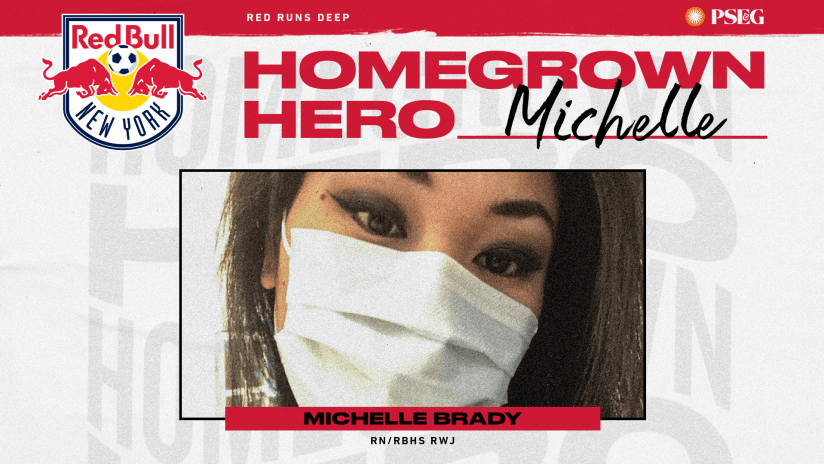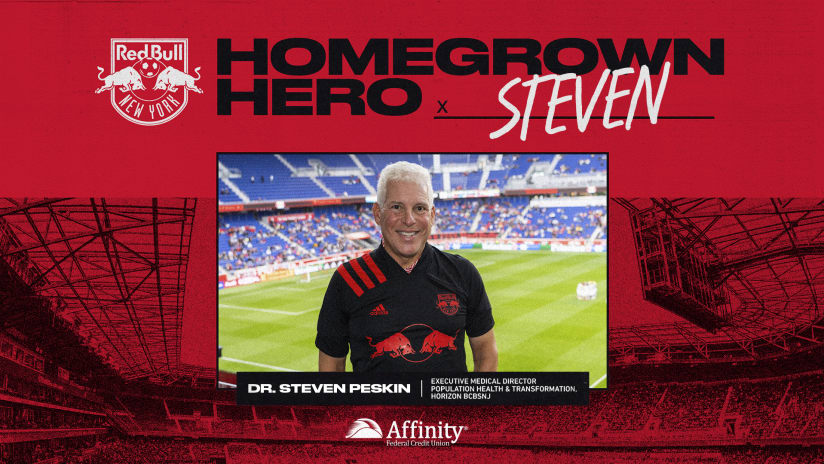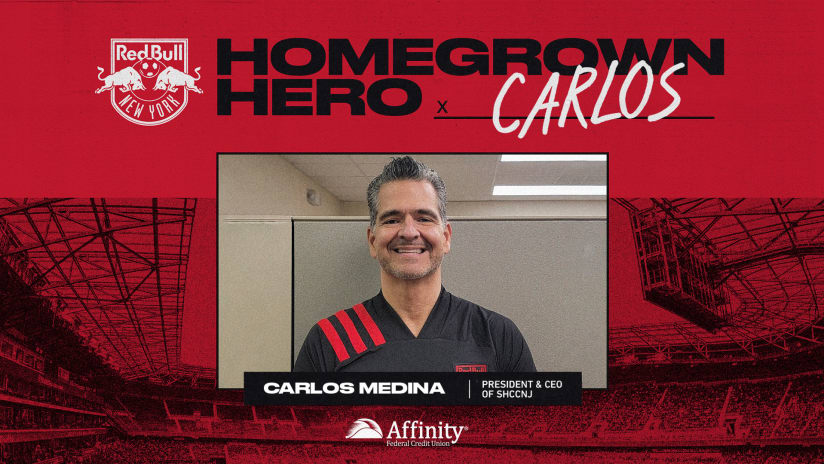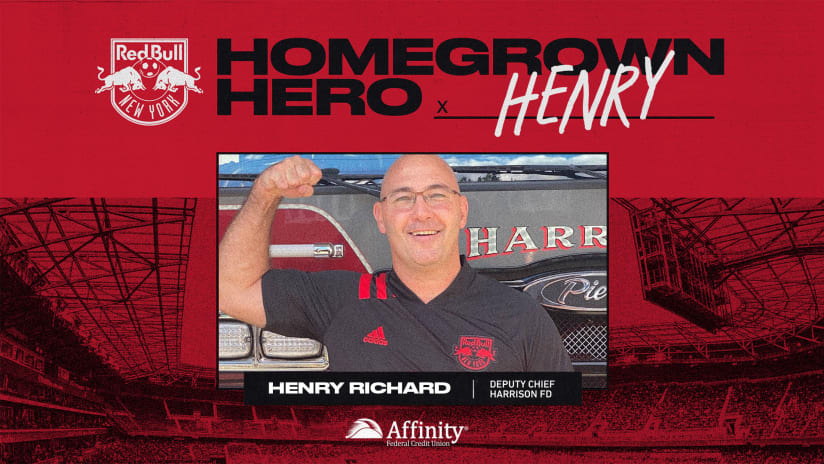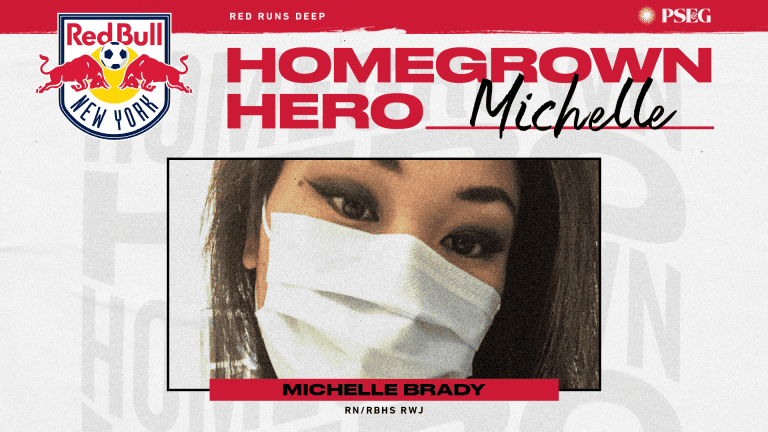
This week’s Homegrown Hero is Michelle Brady, who runs the pain and anesthesia department at Rutgers Robert Wood Johnson in New Brunswick and is also a member of the Viking Army. This past week we caught up with her to know her story about her career, her passion for the New York Red Bulls and how her working routine has changed since the pandemic started. She has seen her twins walk out the player tunnel with our players, and when she comes to Red Bull Arena, “It's a feeling of family. We just have fun, we cheer on the team and we just feel like we belong,” she says.
Her connection to the club and love for the game:
“I mean, I've loved soccer ever since I was little, I played for a little bit, then actually, it kind of died down a little as I got older, but then my kids actually got into it. I actually started managing my kids’ team, then I started taking them to Red Bulls games. From then, I met some of the Viking Army, and I joined the Viking Army. So from then it was just like a family, with tailgating, I got season tickets, and it was something that I looked forward to with my kids and with the Viking Army. After working, it was like my stress reliever. It was something to look forward to with my kids and family.”
What’s your best memory at Red Bull Arena?
“Just going to the stadium with them. I think maybe for my kids when they were in the players’ tunnel, and they actually went out I think last year, my twins went out at the beginning of the game with the players.”
Why did you pursue nursing as your career?
“My family has always been in the healthcare field. My father is a physician, my grandmother was a physician also, so I've always been geared towards health care. To me it came natural, I was always pushed towards that field. It always interested me, and I always wanted to help people. So my field now actually, I'm in anesthesia and pain services, so I run the pain and anesthesia department in Rutgers Robert Wood Johnson in New Brunswick. I have many hats in my position, so it's like we run a fellowship for anesthesia residency. So in my area, I do academics, so we have rotations where the anesthesia fellows rotate into my outpatient clinic, and we kind of teach fellows for a month or two weeks about our outpatient services. And then we have a fellowship where we have physicians who train to become specialists in pain management, how to deal with stimulator implants and everything. I take a lot of physicians under my wing for a year at a time, and we train them to become specialists and then we send them off into the world. And then, you know, I have residents who are with us for three years, and then they attend themselves and then you know, we have patients who come, I have patients whom I’ve known for eight years. I also have another area with Rutgers students because I work for Rutgers Robert Wood, a lot of the sports, the trainers have my phone number. I work constantly, they have like my work cell phone, and they can reach me anytime if one of the athletes get injured and their sports doctors need a little bit of help, they call me and I get them in touch with one of our physicians, and we try to help them out a little. I have like three different areas that I work around with, and I'm the only nurse that does it. I'm all over the place, and when COVID-19 happened, it was like I was trying to figure out different ways of how to get everyone situated. How to get things done and testing; how to get all the patients tested; how to have our residents and fellows still learning even though things were kind at a standstill because they do a lot of elective procedures and surgeries. A lot of our fellows graduate at the end of June, and we have incoming in July, so they had to get all those things done by that time. So it was like, ‘what are we gonna do?’”
Acting as support system to her fellows and working alongside them:
“I honestly love it. I still keep in touch with my fellows from eight years ago, and I see how they're doing, a lot of them are so successful. I'm so proud of them. They're all over the country, a lot of them have started their own practices, a lot of them are well known. It's great to see, and a lot of times there's conferences and we all get together every year. Every year we see what everyone's doing, so I love it. It's kind of like you nurture them from the beginning because most of them start off during residency, so it's three years, then when they do fellowship, that’s the fourth year that they're with me. I have a few that actually have been through medical school with us, so that's like I've known them for almost 10 years of their life. Yeah, like one fellow I have now I've known him for six years. It's rewarding because I see them as a med student, they really don't know much, and then as they progressed, you know, they're an attending physician, and they're working on their own, seeing patients on their own.”
How the COVID-19 pandemic changed her working routine:
“It was a pretty radical change in the beginning. We did a lot of remote working, and we had to come up with doing a lot of telehealth. We were still seeing patients, we do have patients inpatients, and we do have patients outpatient. A lot of our patients too, they don't have a lot of the technology that you need, so we were still seeing patients in our outpatient clinic, so we had to come up with ways that were safe. I was calling them, treating them, making sure that they didn't have any symptoms, they weren't coming in contact with anyone. Once we could finally test patients, then patients were getting tested, and we had to make sure that patients were not coming in at the same time. So it was pretty different, you know, and things were changing like on a daily basis, and we would have to have meetings with our building supervisors, building managers, and it was all the departments were coming together almost daily, trying to figure out what we can do because there's all different departments trying to coordinate patients. Our department so far has been the busiest department; we've been seeing the most patients, we've been actually the most active during this pandemic.”
What makes our club special?
“I think a big part of it is just the fun that we have there. It's a feeling of togetherness, and when we go there, we just have so much fun, especially being with the Viking Army. It's a feeling of family. We just have fun, we cheer on the team and we just feel like we belong.”


